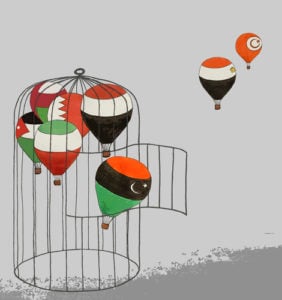Foreign Policy Association
Arab Revolutions: Remembering The First Days
MIDDLE EAST
by adilelassali | on February 11th, 2012 |
 It would be my first blog on the great transformation taking place in the Arab World, and it is a transformation long overdue. What’s happening is not a freak moment in history but it is rather a natural reaction to what has been a long suppression of Arabs by other fortunate Arab oligarchs and bands of opportunists. Leaders, they were not. I remember when Omar Suleiman, the supposed Vice President of Egyptian President Hosni Mubarak, announced the latter’s resignation; I screamed of joy, I was ecstatic. It can happen! It just happened! I said to myself; Arabs can remove a president if that president betrays their trust, if he deprives them from basic dignity and freedoms. It first happened in Tunisia, but it was fast and it surprised everyone, even intelligence agencies that were supposed to be intelligent in gathering intelligence were unprepared for what was brewing. We did not it see it unfold day-by–day in Tunisia, Zine-Albidine Ben Ali rushed and fled the country, leaving everyone in a state of shock. I remember listening to the prophets of CNN and MSNBC dismissing rumors of contagion of this small revolution. They were wrong; the symptoms for the political and economic ills of Tunisia were prevalent in all Arab countries, hence, the revolution spread from the Atlantic to the Gulf, shaking the throne of some kings and toppling the self-appointed king of kings Muammar Qaddafi.
It would be my first blog on the great transformation taking place in the Arab World, and it is a transformation long overdue. What’s happening is not a freak moment in history but it is rather a natural reaction to what has been a long suppression of Arabs by other fortunate Arab oligarchs and bands of opportunists. Leaders, they were not. I remember when Omar Suleiman, the supposed Vice President of Egyptian President Hosni Mubarak, announced the latter’s resignation; I screamed of joy, I was ecstatic. It can happen! It just happened! I said to myself; Arabs can remove a president if that president betrays their trust, if he deprives them from basic dignity and freedoms. It first happened in Tunisia, but it was fast and it surprised everyone, even intelligence agencies that were supposed to be intelligent in gathering intelligence were unprepared for what was brewing. We did not it see it unfold day-by–day in Tunisia, Zine-Albidine Ben Ali rushed and fled the country, leaving everyone in a state of shock. I remember listening to the prophets of CNN and MSNBC dismissing rumors of contagion of this small revolution. They were wrong; the symptoms for the political and economic ills of Tunisia were prevalent in all Arab countries, hence, the revolution spread from the Atlantic to the Gulf, shaking the throne of some kings and toppling the self-appointed king of kings Muammar Qaddafi.
Egypt, January 25th, 2011 I was home all day glued to my TV watching Aljazeera Arabic. Hoping for a repeat, I see the hallmarks, but I am not sure. I read books describing revolutions of past history but I’ve never lived during or witnessed one, will the Egyptians do what their neighbors did two weeks before them, I have to stay tuned, I am. Every time Hosni Mubarak appears on TV, I say, this is it, only to have my hopes dashed and despair overtake me. During the three weeks, starting January 25th a struggle was taking place between the forces of the despot and the forces of the common weal. Sunday through Thursday momentum subsides and remains so until Friday, bringing another meaning to TGI Fridays, when the Egyptians come out in force after Friday prayers to demand the removal of the regime.
Egyptians did remove the regime, so did the Libyans, but with a heavy price. Moroccan compromised for greater transparency and accountability to the Parliament and elected representatives of the people. Yemenis deposed of the head of the regime but not the regime. Gulf countries bought the people’s hearts and tolerance of the regimes with an expensive and expansive social safety net. The Libyans suffered huge number of fatalities in their quest for freedom. Freedom has a price. Unfortunately for Muammar Gaddafi, he miscalculated, had he shown mercy to his people and spared them the months of bombing and killing by mercenaries, they could’ve been reciprocal toward him after his capture. Alas, as the common wisdom taught us: you reap what you sow. Arrogance is blinding. Wittingly or unwittingly, Bashar El-Assad is following in Gadhafi’s footsteps, believing that mass murder will save his dynasty.
Bashar El-assad is betting on the strategic alliance his country has with the republic of Iran and the complex make-up of the sectarian allegiances in Syria, Lebanon and Iraq. The Middle East have seen the disastrous consequences of a civil war in Iraq, and it is trying by all means to avoid a repeat of such a scenario that could engulf the region. Russia will try it’s hardest not to break with its last ally in the Middle East. If the regime in Syria falls, Russia will lose its last totalitarian friend in the region. The people of Syria, however, are betting on their determination and the tectonic movements around them. Just like no one has predicted the spontenous start of these revolutions, no one can foretell how will they end. One year on, The transformation is still progress.






